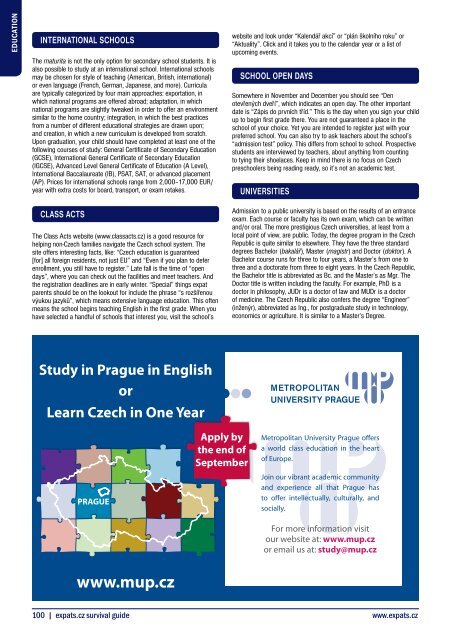p17tb85kpn4am1jcl1n5h13maat24.pdf
You also want an ePaper? Increase the reach of your titles
YUMPU automatically turns print PDFs into web optimized ePapers that Google loves.
education<br />
inteRnAtionAl SchoolS<br />
The maturita is not the only option for secondary school students. It is<br />
also possible to study at an international school. International schools<br />
may be chosen for style of teaching (American, British, international)<br />
or even language (French, German, Japanese, and more). Curricula<br />
are typically categorized by four main approaches: exportation, in<br />
which national programs are offered abroad; adaptation, in which<br />
national programs are slightly tweaked in order to offer an environment<br />
similar to the home country; integration, in which the best practices<br />
from a number of different educational strategies are drawn upon;<br />
and creation, in which a new curriculum is developed from scratch.<br />
Upon graduation, your child should have completed at least one of the<br />
following courses of study: General Certificate of Secondary Education<br />
(GCSE), International General Certificate of Secondary Education<br />
(IGCSE), Advanced Level General Certificate of Education (A Level),<br />
International Baccalaureate (IB), PSAT, SAT, or advanced placement<br />
(AP). Prices for international schools range from 2,000–17,000 EUR/<br />
year with extra costs for board, transport, or exam retakes.<br />
clASS ActS<br />
The Class Acts website (www.classacts.cz) is a good resource for<br />
helping non-Czech families navigate the Czech school system. The<br />
site offers interesting facts, like: “Czech education is guaranteed<br />
[for] all foreign residents, not just EU” and “Even if you plan to defer<br />
enrollment, you still have to register.” Late fall is the time of “open<br />
days”, where you can check out the facilities and meet teachers. And<br />
the registration deadlines are in early winter. “Special” things expat<br />
parents should be on the lookout for include the phrase “s rozšířenou<br />
výukou jazyků”, which means extensive language education. This often<br />
means the school begins teaching English in the first grade. When you<br />
have selected a handful of schools that interest you, visit the school’s<br />
website and look under “Kalendář akcí” or “plán školního roku” or<br />
“Aktuality”. Click and it takes you to the calendar year or a list of<br />
upcoming events.<br />
School open dAyS<br />
Somewhere in November and December you should see “Den<br />
otevřených dveří”, which indicates an open day. The other important<br />
date is “Zápis do prvních tříd.” This is the day when you sign your child<br />
up to begin first grade there. You are not guaranteed a place in the<br />
school of your choice. Yet you are intended to register just with your<br />
preferred school. You can also try to ask teachers about the school’s<br />
“admission test” policy. This differs from school to school. Prospective<br />
students are interviewed by teachers, about anything from counting<br />
to tying their shoelaces. Keep in mind there is no focus on Czech<br />
preschoolers being reading ready, so it’s not an academic test.<br />
uniVeRSitieS<br />
Admission to a public university is based on the results of an entrance<br />
exam. Each course or faculty has its own exam, which can be written<br />
and/or oral. The more prestigious Czech universities, at least from a<br />
local point of view, are public. Today, the degree program in the Czech<br />
Republic is quite similar to elsewhere. They have the three standard<br />
degrees Bachelor (bakalář), Master (magistr) and Doctor (doktor). A<br />
Bachelor course runs for three to four years, a Master’s from one to<br />
three and a doctorate from three to eight years. In the Czech Republic,<br />
the Bachelor title is abbreviated as Bc. and the Master’s as Mgr. The<br />
Doctor title is written including the faculty. For example, PhD is a<br />
doctor in philosophy, JUDr is a doctor of law and MUDr is a doctor<br />
of medicine. The Czech Republic also confers the degree “Engineer”<br />
(inženýr), abbreviated as Ing., for postgraduate study in technology,<br />
economics or agriculture. It is similar to a Master’s Degree.<br />
100 | expats.cz survival guide www.expats.cz


